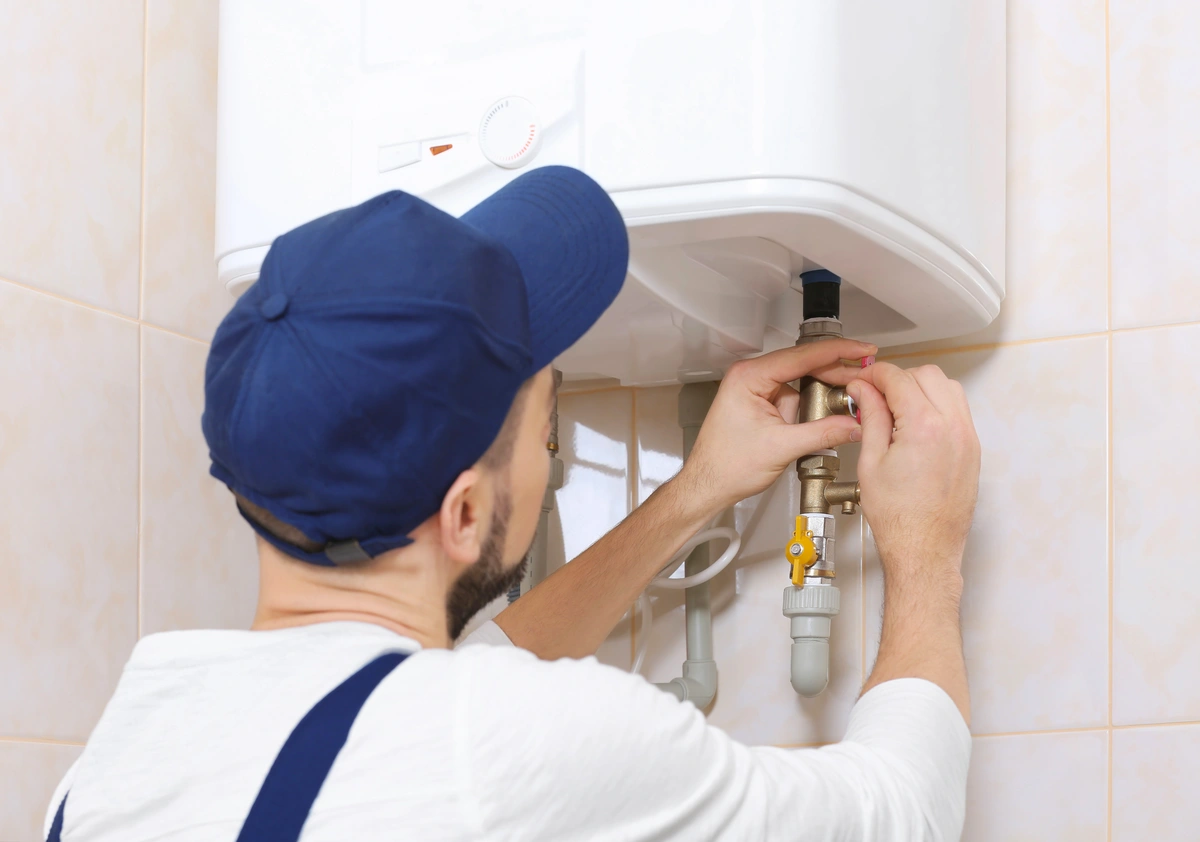When your water heater breaks down, it is never fun. And not just because a broken water heater often announces itself with an icy cold shower experience!
Unfortunately, nothing lasts forever, and if you are planning to live in your current home for years to come, it is likely that you will have to replace your water heater eventually. The good news is that you are living in an age where you have many different options when it comes to your water heater.
Traditional water heaters have certainly been tried and tested over the years, but these days there is a new model on the market that is taking the world of water heaters by storm! We’re talking about tankless water heaters.
That’s right. Tankless!
How Does A Tankless Water Heater Work
Let’s get right down to it. What exactly is a tankless water heater and how does one work?
Like all water heaters, a tankless model does exactly what it says in the name: provides your home with hot water! However, unlike traditional water heaters, which are filled with water that is slowly heated inside a tank, tankless units don’t store water at all!
Instead, this wall-mounted unit contains a heating element that rapidly heats water as it passes through it. The hot water then rushes through your pipes and out through your hot water tap.
Tankless water heaters deliver hot water on demand without a storage tank, making them energy-efficient and suitable for both residential and commercial use. They provide a continuous supply of hot water with higher flow rates, require less space, and have a longer life expectancy compared to traditional water heaters.
Tankless vs. Storage Tank
If tankless water heaters are so great, why doesn’t everyone have one? It’s a fair question with a complicated answer. While we personally love the benefits that come with tankless water heaters, there are some great reasons to opt for a storage tank heater instead!
Storage Tank Water Heaters
Storage tank water heaters are by far the most common form of water heater in the U.S. They’ve been in use since the late 1800’s and come in a variety of different forms, including gas, electric, and oil heater styles.
This type of conventional water heater is filled with water that is slowly heated as the water sits in the tank. When you switch on your hot water tap, the heated water travels through your plumbing.
With a design that has lasted this long, you can bet there are some clear benefits. However, there are some cons that come along with them, as well.
Pros:
- Affordable – Typically, traditional storage water heaters will be more affordable than their tankless counterparts.
- Easy Repairs – Because most plumbers and home service professionals will have experience with a tank water heater, you can count on them to have expert advice and solutions for any troubles you might
- Good for Busy Homes – There’s nothing worse than the fight for hot water dominance when two areas of your home require it at the same time. If you want to be able to shower while your dishwasher is running, or if you have a large home, you might be better off sticking with a storage tank.
Cons:
- Energy Efficiency – While storage tank heaters have come a long way in the past few years, they simply aren’t as efficient as most tankless water heaters.
- Space – One of the biggest downsides of a traditional water heater is the amount of space that they take up in a room. If you live in a smaller home and want to maximize your space, you may want to consider switching to a smaller, tankless unit.
Tankless Water Heaters
Considering making the switch to a tankless heater but aren’t convinced? Here are some of the pros and cons.
Pros:
- Energy Efficiency – Because tankless units only heat the water that you actually use, they are significantly more energy efficient than traditional models.
- Endless Hot Water – Unlike a storage tank heater, which can only provide as much hot water as it can be filled with, a tankless water heater can provide you with hot water for as long as you need it.
- Space Saver – Tankless water heaters are small and mounted on your wall. This means that they can help to free up a significant amount of floor space for you.
Cons:
- Price – Tankless water heaters tend to have a significantly higher upfront cost than a storage water heater. However, due to their high energy efficiency, you may save on energy costs in the long run.
Tankless Water Heater Efficiency
Efficiency of tankless water heaters is evident through their energy-saving pilot light and on-demand heating. Unlike traditional storage water heaters, they supply continuous hot water and consume less gas value, reducing fire hazards. Additionally, tankless electric heaters are compact and suitable for new homes.
Energy Conservation & Cost-Effectiveness
Tankless water heaters efficiently heat water only as needed, reducing energy consumption. With a long lifespan and high energy factor, they are cost-effective and eco-friendly, cutting down on energy bills. Providing hot water instantly, they eliminate standby energy losses, promoting energy conservation and savings.
Continuous Hot Water Supply
Tankless water heaters ensure continuous hot water without a storage tank, meeting high demands. The flow sensor activates heating instantly, providing hot water as needed for various tasks, avoiding cold bursts and wait times.
Tankless Water Heater Power Sources
Tankless water heaters utilize either electricity or gas as their power source, with electric models employing heating elements and gas units utilizing a burner and heat exchanger. The power source significantly impacts the unit’s size and efficiency, emphasizing the importance of proper installation and maintenance for safe and effective operation.
Electric Element Water Heaters
Electric element tankless water heaters eliminate the need for a storage tank, using heating elements to heat water as it flows through the unit. When a hot water faucet is turned on, the heating elements activate, providing energy-efficient hot water on demand.
Gas Burner Water Heaters
Gas burner water heaters differ from traditional tank water heaters by heating water on-demand using natural gas or propane. The gas burner heats a heat exchanger to warm the water as it passes through. These tankless water heaters are more energy-efficient and require proper ventilation to prevent carbon monoxide buildup.
Tankless Water Heater Installation Process
Proper installation of tankless water heaters requires expertise and adherence to building codes. It involves assessing gas supply, water flow, and electrical requirements. Venting and air supply are crucial for gas heaters, while electric ones need proper electrical connections and heat exchanger installation.
Preparation For Installation
Assessing water supply and demand is crucial for tankless water heater installation. Gas units require proper gas line sizing, venting considerations, and adherence to building codes. Electric units need electrical panel assessment, adequate power supply, and water treatment check-ups before installation. Checking local building codes and permits is also essential.
Maintenance Needs Post-Installation
After installation, tankless water heaters need regular maintenance to prevent mineral buildup and maintain efficiency. This involves checking heat exchangers, vents, gas valves, and electrical components. Following manufacturer guidelines for flushing is essential to maximize energy savings and flow rates.
Tankless Water Heater Potential Issues
Misuse, like overloading, can result in inadequate hot water. Mineral buildup affects performance. Selecting the right size is crucial to meet demand. Improper installation and maintenance contribute to issues. Intermittent ignition device may cause performance problems.
Risk of Misuse
Misusing tankless water heaters strains the system with excessive hot water demand, impacting performance and energy efficiency. Continuous high demand may lead to reduced flow rates and insufficient hot water supply. Proper sizing and understanding hot water demands are vital to avoid misuse risks.
Performance & Mineral Build-Up
Mineral accumulation may diminish hot water flow and energy efficiency in tankless water heaters. Routine maintenance helps avert this and maintains consistent performance. Over time, minerals can impact heat exchanger efficiency and hot water supply, indicating the need for flushing to restore optimal performance.
Tankless Water Heater Cost
Ah yes. That “cost” thing we mentioned. How much are we actually talking here?
Tankless water heaters for a whole home generally cost between $800-$3,000 dollars. Those prices do not include labor costs, which can easily add an extra $500 or so to the final cost of your projects.
By contrast, you can purchase a new storage tank heater for $500-$1500. Keep in mind that while this may seem like a better bargain, storage tanks typically only last for around 15 years, whereas tankless units can last up to thirty!
Selecting The Right Tankless Water Heater
Factors such as hot water demand, flow rates, and temperature rise influence tankless water heater selection. Electric tankless water heaters may have separate considerations, such as electrical capacity and element rating. Proper sizing ensures enough hot water for specific applications. Understanding hot water usage patterns and peak demand helps in choosing the right tankless water heater, while considering energy factor, flow rates, and local building codes guides in decision-making.
Factors to Consider
Selecting a tankless water heater involves assessing hot water demand, flow rates, and temperature rise. Electrical, gas, and water supply requirements, as well as energy efficiency and local building codes, are essential considerations. Long-term energy savings, maintenance needs, and life expectancy also impact the choice.
Making an Informed Decision
Tankless water heaters operate on demand, yielding continuous hot water within unit capacity. They are energy-efficient, extending lifespan and cutting utility costs. Household size and hot water usage patterns are key factors in deciding if they are suitable.
Discuss Your Options With a Professional
Making the switch to a tankless water heater can be exciting but might leave you with a lot of questions.
Don’t worry! Black Tie Plumbing is here to help! As your local plumbing experts, we can help assess your home and recommend a system based on your budget and personal needs.





